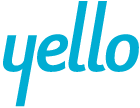A Recruiter’s Guide to Executing a Successful Campus Recruitment Event
With more than 70% of companies planning to recruit on campus, the competition is on to attract young talent at universities across the country. Learn more about how to execute a successful campus recruitment event in our data-driven, technological age.
According to a recent study by Aptitude Research Partners, almost 70% of employers are hiring recent college graduates, with 25% of enterprise companies attending an average of 25 campus recruitment events each season. However, only 30% of companies measure the effectiveness of their recruiting efforts, according to Harvard Business Review.
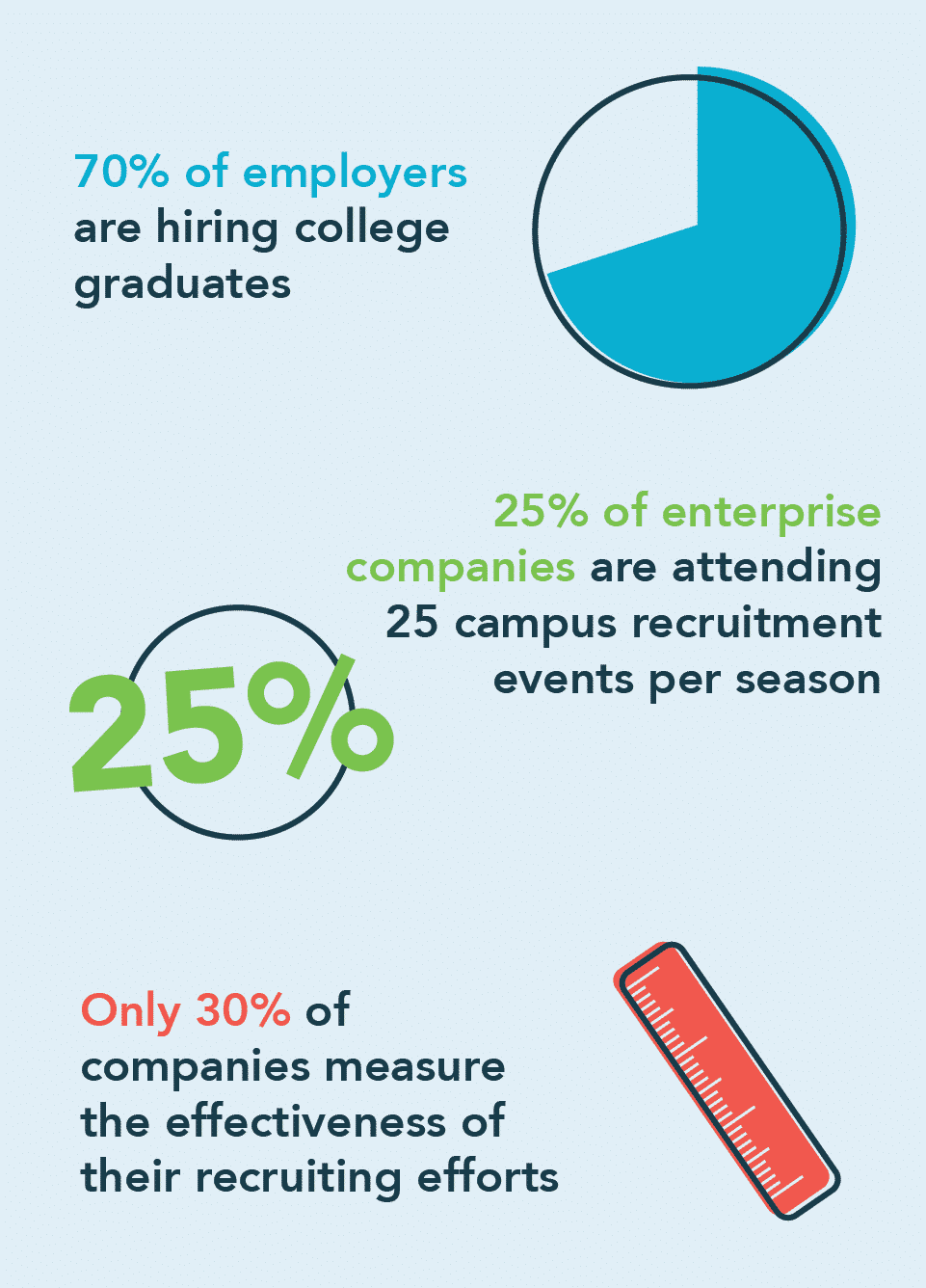
Qualities of a strong campus recruitment event
What are the hallmarks of a successful career fair?
- The right universities
Evaluate your campus relationships. Which colleges have historically produced the best new hires? Which universities offer relevant majors to the open roles you’re filling? Which career centers are most willing to work with your organization? Build Campus Profiles to track relationships and ROI at each school. - High student attendance
Keep track of how many attendees are at each career fair, and ask the career services center if they’ll share an RSVP list before you step foot on campus. Knowing how many potential applicants you’ll reach will help you prioritize which schools to visit. - A strong hiring team
Select campus recruiters who are engaging, boost excitement about your company and reflect your employer brand well. This team should be knowledgeable about your organization’s internship opportunities and full-time positions. If possible, send alumni from your company to serve as a relatable face for your team. - The right technology
Campus recruitment software helps you source candidates, engage students with emails and texts before, during and after an event, and collect resumes and evaluate candidates at career fairs.
Download the ultimate campus recruitment events checklist
Setting campus recruitment event goals
To prepare for your next semester’s hiring event, start planning now. A good campus recruitment strategy starts with goal-setting. Think about how you’re hoping to impact your business by attending career fairs. Which positions are you hoping to fill? How many students are you hoping to meet? Setting campus recruitment KPIs will help you make the most of your time on campus.
Align with the team’s strategic plan
When establishing hiring event metrics, align with the team’s strategic plan. Prior to each event, ensure every team member is working towards the same goals and is focused on the same results. Follow the below steps to align individual events with the team’s overall goals:
- Establish a strategic goal (i.e. Reduce overall sourcing time)
- Create an execution strategy (i.e. Build candidate pipeline by attending career fairs, building a recruitment marketing brand and nurturing a talent community)
- Focus on a measurable metric (i.e. Increase passive candidate pipeline by 60% by end of the year)
Revisit goals
Review both team and individual goals prior to every event. Ensure every team member attending the events understands key metrics that will achieve these goals. Below are suggested metrics to ensure team members stay focused.
- Interviews scheduled to offers accepted ratio. Track the candidate journey all the way through — from interviews scheduled to offers accepted — and identify the events that result in the most qualified candidates. Set event-specific benchmark success ratios that align with your team’s recruiting goals.
- Offers made to offers accepted ratio. If the candidates you meet at hiring events make it through the interview process and aren’t accepting offers, determine if your company’s interview process is too long or if you need to provide your team with additional interview training. Use that insight to continually improve.
- Number of new candidates in your talent community post-event. Not everyone you meet will be an immediate match with your company, but they may be in the future. Hiring events are an opportunity to grow a passive talent pipeline, so establish growth goals to be prepared for future hiring needs.
Hold individuals accountable
Every team member attending the events should be accountable for the results. Set individual goals that tie to the overall department goals to keep each recruiter accountable and focused on reaching the department’s goals.
Look ahead
If your team doesn’t have goals in place, use this as an opportunity to set goals for the year ahead. The foundation of a successful plan includes: assessing historical data to establish new recruitment event goals; creating a tactical plan to accomplish each goal; and identifying the resources needed, such as talent acquisition software, to execute these tactics.
Possible recruitment event metrics
- Universities attended
- Students met
- Qualified candidates per college
- Resumes collected
- Applications received
- CRM responsiveness
- Cost per event
- Hires per event
Team preparation and recruitment event best practices
While major event logistics—travel arrangements, booth locations, event assignments—are likely finalized well in advance, meet with your team prior to individual events to tie up any remaining loose ends. Here’s are a few recruitment event best practices to prepare for:
- Check and recheck team logistics. Communicate with the college’s career center before the event. Understand how booths are set up, where the career fair will be located on campus, and how students will flow in and out of the room.
- Confirm final attendance. Particularly if you have new team members, review event dress codes, the company’s travel and expense policy and event behavior. Eliminate any housekeeping questions that may arise prior to the events, so every team member can focus on representing the company in the best light.
- Know which positions you’re actively trying to fill. Understand what your organization’s needs are and how students might help with fill open roles. Are you looking for interns, part-time help or full-time employees? Consider providing your recruiters with talking points for each open roles so that they can effectively communicate the skills necessary to be successful in each role, and answer any questions students have.
- Decide how your booth will be set up. How will you showcase your company’s brand? Are you going to show videos? Bring posters? Give away swag? How many recruiters will you need to staff the booth? Figure out the exact layout of your booth before you arrive so that setup will be quick and easy.
- Bring business cards and wear a nametag. Generation Z wants to make personal connections with their recruiters, so it’s important to help them put a name to a face when you’re on campus. Make sure students know who you are and how to get in touch with you after the career fair is over if they have questions.
- Make a strong impression. Career fairs can be tiring, and it’s tempting to sit behind a table and wait for students to come to you. However, standing in front of your booth and mingling with job seekers looks more engaging, invites students in, and ultimately makes a stronger impression for your company.
- Review event software. Gone are the days of collecting paper resumes. Use campus recruiting software so that students can check into your booth digitally and add their information to your candidate database. Evaluate students on the spot and send follow-up communication to the students you spoke with.If new team members have joined your organization, make sure they are fully versed on your recruiting software. Every recruiter should be able to navigate the software seamlessly. At the event, every team member should be able to upload resumes, create a record of event attendance and track all recruiter and candidate actions in the platform.
- Follow up. Finally, don’t forget to follow up with your candidates. Whether you do so by email, text, or social media, a follow up continues to engage potential job candidates, keeping you on their mind during their job search.
Download the ultimate campus recruitment events checklist
Candidate communication before, during and after a career fair
Communicating with attendees throughout the recruitment event process is the best way to ensure students show up, understand your employer brand, and join your talent community long-term. Here’s how to build a recruiting event communication plan:
Create a candidate communication plan
Share your upcoming event schedule with talent community members through newsletters and targeted emails. Provide candidates the option to self-schedule meeting slots with your team at events. This will help your team prioritize meetings with top candidates, and prevent high-potential recruits from slipping through the cracks on campus.
Engage your talent pipeline
Your team will meet more qualified candidates than you’ll be able to slot into open positions. Capture every candidate by adding them to your organization’s talent community so that your company can stay top-of-mind until a relevant role opens. Communicate regularly with these candidates, sharing company awards or accolades, open positions, industry events or networking opportunities. Track the engagement rates of all communication sent to candidates so you can adjust your engagement plan accordingly.
Communicate the process
Every candidate who interacts with your team should have a solid grasp of the next steps in the hiring process. Work with your team to communicate the high-level next steps for open positions to facilitate transparency and build trust. Can candidates expect a video interview or a phone screen? Are in-person interviews a final step, or in the near future? Will the company provide updates along the way, or at the end of the process?
Make your hiring protocol crystal clear
Because the number of candidates attending hiring events can be large, it can be tempting to blur lines and allow exceptions to your normal hiring procedures to accommodate the volume of potential applicants. It’s important to adhere to your organization’s standard hiring practices at events. Maintain consistency with the type of applicant you are looking for, how positions are pitched to prospective employees, what application procedures and resumes will be accepted at the event and when people can expect to hear back from you.
Review interview training best practices
It’s important that candidates have a stellar interview experience with your company. Hold trainings with new and seasoned employees to ensure they understand the company’s candidate selection qualifications and interview process. Send an all-team email with interviewing best practices, the company mission and refreshers on dos and don’ts for interviewing. This reminder will help ensure every candidate’s interview experience remains consistent and aligned with the organization’s employer brand
Time-to-hire post-event
Maintaining a low time-to-fill means moving candidates quickly through the interview, evaluation, offer and acceptance stages to prevent losing great talent to competitors.
Measure candidate satisfaction
After the interview process is complete, send an automated survey to every candidate. Use these findings to ensure your candidate experience reflects your organization’s recruitment brand and overall strategic hiring goals.
Candidate communication timeline
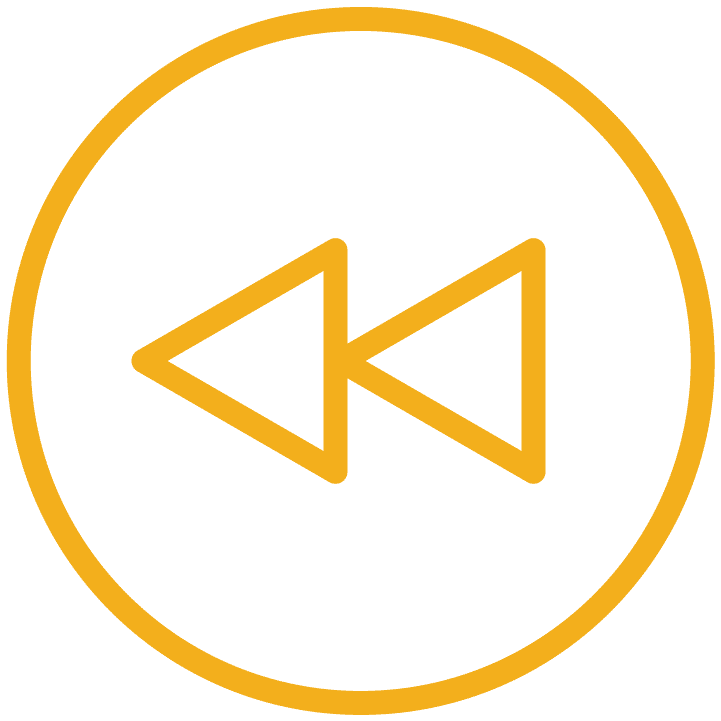
Pre-event
- Start communicating 8-12 weeks in advance to create pre-event buzz
- Share recruitment marketing materials that will help students get to know your company
- Ask candidates to pre-register
- Promote event attendance on social media
- Update your career site with event information
- Print promotional materials for career fair booth
- Track all campus relationships, logistics and budgets in a single location all team members can access
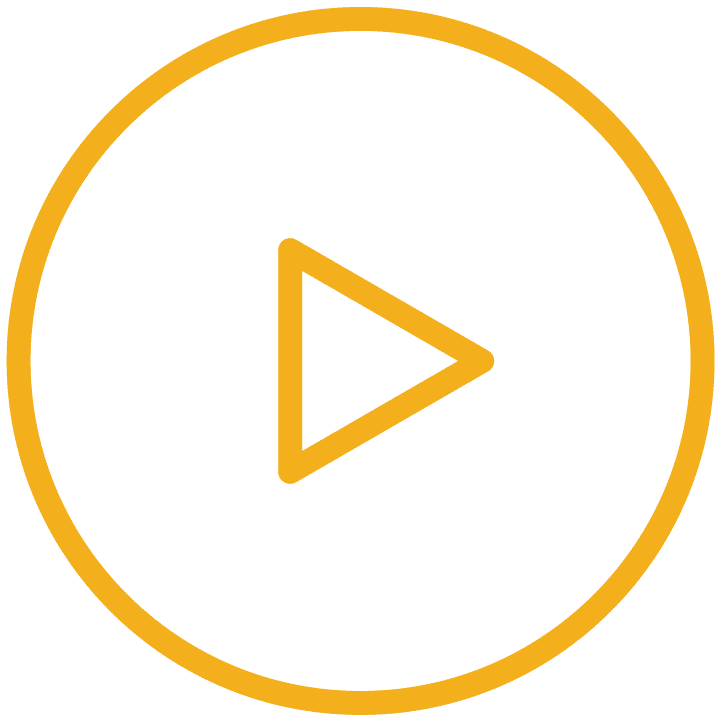
During events
- Schedule day-of communications in advance
- Use campus recruitment software to collect resumes and evaluate students
- Send texts or emails to encourage candidates to self-schedule live or video interviews
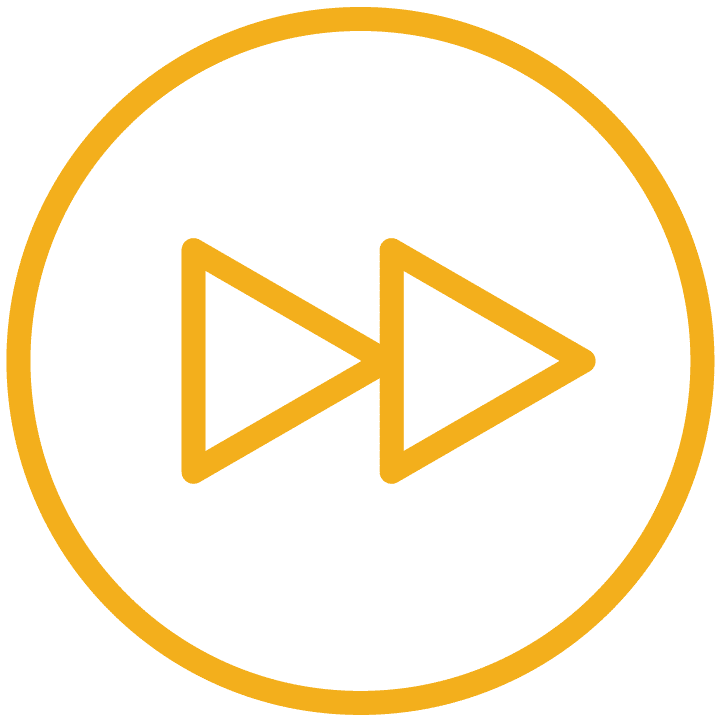
Post-event
- Send thank you emails to students immediately after the event
- Share relevant links to apply, learn more about your company or join your talent community
- Evaluate candidates and move forward in the hiring process
- Review results by campus to begin determining strategy moving forward
